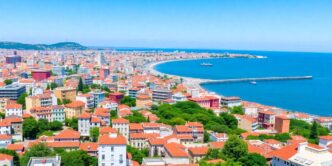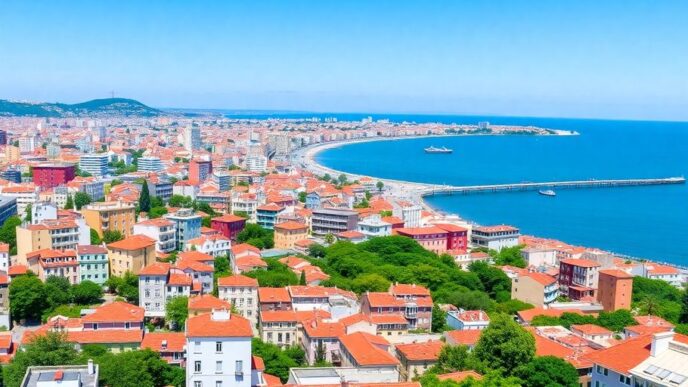As Portugal’s tourism industry expands, so does the demand for skilled labor to meet the needs of millions of annual visitors. While the country has developed a strong educational infrastructure to support careers in hospitality and tourism, challenges persist, notably in attracting and retaining enough workers to fill key roles. The government and private sector are investing in training programs, yet Portugal increasingly relies on foreign labor to sustain its tourism workforce.
Growth of the Tourism Workforce and Foreign Labor
According to Portugal’s National Institute of Statistics (INE), the tourism sector employed approximately 400,000 people in 2023, accounting for around 10% of the national workforce. As tourism rebounded after the COVID-19 pandemic, Portugal saw a surge in visitor numbers, intensifying the demand for skilled workers in hotels, restaurants, and cultural venues. This rapid growth has heightened the need for both native and foreign workers, with an estimated 15% of tourism jobs held by foreign nationals, according to INE’s latest report.
Most foreign workers come from Portuguese-speaking countries such as Brazil, Angola, and Cape Verde, although recent years have seen more arrivals from Eastern Europe, particularly Ukraine, and other EU countries. The Portuguese Immigration and Borders Service (SEF) reported that the number of foreign workers in the hospitality sector increased by 20% from 2022 to 2023, as businesses turned to external labor to cope with staffing shortages.
Education and Training in Tourism
Portugal boasts a variety of specialized educational institutions dedicated to preparing students for careers in tourism and hospitality. The Escola de Hotelaria e Turismo de Lisboa (Lisbon School of Hospitality and Tourism) is among the most prestigious institutions, offering comprehensive programs in hotel management, culinary arts, and tourism marketing. In addition, Escola de Hotelaria e Turismo do Algarve provides specialized training aligned with the Algarve’s role as Portugal’s top tourist destination, focusing on skills needed in high-demand sectors like golf and luxury hotel services.
These institutions emphasize both theoretical knowledge and practical experience, often partnering with industry leaders to provide internships and on-site training. The quality of education in these schools is highly regarded, with Portuguese tourism graduates known for their expertise in hospitality management. However, despite the availability of high-caliber local talent, labor shortages persist due to high seasonal demand and the draw of higher wages abroad for Portuguese citizens trained in hospitality.
Challenges in Meeting Labor Demand
Even with a well-regarded educational infrastructure, Portugal faces several hurdles in meeting the labor demand within its tourism sector. Low wages, especially in entry-level roles, contribute to difficulties in attracting local talent. The average monthly wage in the hospitality sector is around €750 to €1,000, significantly lower than other sectors. Many skilled Portuguese workers in tourism are drawn to opportunities in countries like Switzerland and the UK, where wages are substantially higher, leading to a brain drain within the industry.

The seasonal nature of tourism in Portugal, particularly in regions like the Algarve, exacerbates labor shortages. While some workers are hired on temporary contracts for peak season, this limits the sector’s appeal to those seeking stable, year-round employment. To address this, Portugal has eased restrictions on work permits for foreign nationals, with simplified visa processes and incentives to attract non-EU workers, particularly from Brazil and the Community of Portuguese Language Countries (CPLP).
Importance of Foreign Workers and Government Initiatives
With native Portuguese workers increasingly leaving for opportunities abroad, foreign labor has become crucial for sustaining Portugal’s tourism industry. Recognizing this, the Portuguese government has launched initiatives to streamline visa applications for foreign workers and encourage their integration into the workforce. In 2023, the government introduced the Portugal Digital Nomad Visa, which facilitates work visas for foreign professionals, and while not exclusively aimed at tourism, it complements efforts to attract skilled international talent.
Furthermore, the Instituto de Emprego e Formação Profissional (IEFP), Portugal’s employment and vocational training institute, has developed targeted training programs to help workers develop language skills, cultural sensitivity, and technical competencies relevant to tourism. These initiatives are part of a broader government strategy to promote Portugal as an inclusive, multicultural tourism destination that values the contributions of foreign workers.
Data and Trends in Foreign Employment
International organizations like the OECD report that the percentage of foreign workers in Portugal’s tourism sector is one of the highest in the EU. In its 2023 Employment Outlook, the OECD highlighted that the Portuguese tourism sector’s reliance on foreign labor is a response to both local labor shortages and the demands of an expanding industry. For example, Brazilian nationals make up a significant proportion of new hires in hospitality roles, while Ukrainians have recently entered the workforce in construction and seasonal positions.
Additionally, a recent survey by the European Travel Commission (ETC) showed that Portugal ranks as one of the top destinations with the highest labor mobility within the EU, underscoring the need for foreign labor in maintaining its tourism workforce. According to the ETC, about 70% of tourism businesses in Portugal rely on some form of foreign labor to fill staffing gaps during peak seasons, especially in the Algarve and Lisbon regions.
Conclusion: A Future of Collaboration and Growth
As Portugal’s tourism industry continues to grow, the need for skilled and dedicated workers remains paramount. While Portuguese institutions like the Escola de Hotelaria e Turismo have made significant strides in developing local talent, foreign workers are essential for filling key roles, especially during peak seasons. To ensure a sustainable workforce, Portugal’s tourism sector must balance attractive training programs, competitive wages, and integration of foreign labor. By fostering an environment that values both local expertise and international contributions, Portugal is well-positioned to support a thriving, diverse tourism industry for years to come













